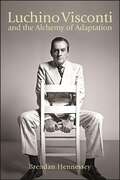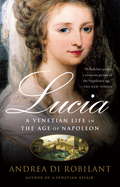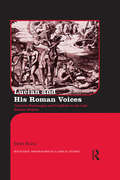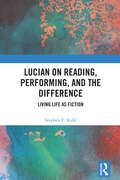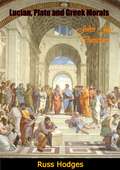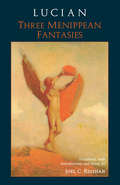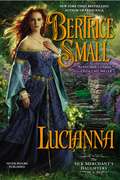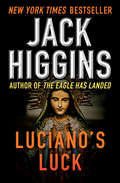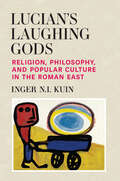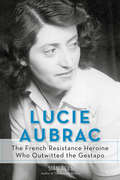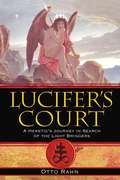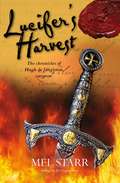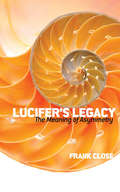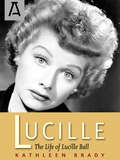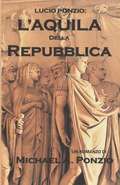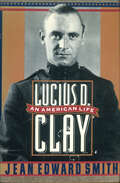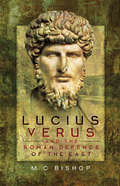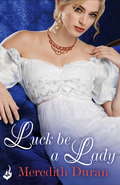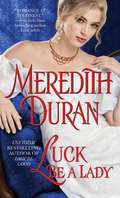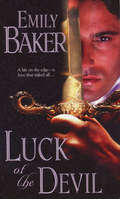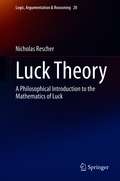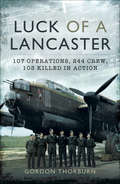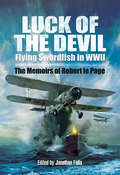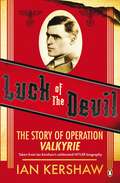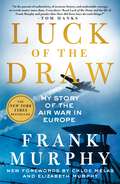- Table View
- List View
Luchino Visconti and the Alchemy of Adaptation (SUNY series, Horizons of Cinema)
by Brendan HennesseySince the beginning, much of Italian cinema has been sustained by transforming literature into moving images. This tradition of literary adaptation continues today, challenging artistic form and practice by pressuring the boundaries that traditionally separate film from its sister arts. In the twentieth century, director Luchino Visconti is a keystone figure in Italy's evolving art of adaptation. From the tumultuous years of Fascism and postwar Neorealism, through the blockbuster decade of the 1960s, into the arthouse masterpieces of the 1970s, Visconti's adaptations marked a distinct pathway of the Italian cinematic imagination. Luchino Visconti and the Alchemy of Adaptation examines these films together with their literary antecedents. Moving past strict book-to-film comparisons, it ponders how literary texts encounter and interact with a history of cultural and cinematic forms, genres, and traditions. Matching the major critical concerns of the postwar period (realism, political filmmaking, cinematic modernism) with more recent notions of adaptation and intermediality, this book reviews how one of Italy's greatest directors mined literary ore for cinematic inspiration.
Lucia
by Andrea Di RobilantIn 1797, Lucia, the beautiful sixteen-year-old daughter of a Venetian statesman, was married off to Alvise Mocenigo, scion of one of the wealthiest and most powerful families of the once glorious maritime Republic. They were a golden couple in Venice_s twilight years. But Lucia_s life was suddenly transformed when the thousand-year-old Serenissima collapsed under the blows of young Bonaparte in 1797. This is Lucia's story, from dazzling young hostess in Habsburg Vienna, lady-in-waiting at the court of Prince Eugene de Beauharnais in Milan, single mother in Paris during the fall of Napoleon_s Empire or as Byron_s hard-fisted landlady during the poet_s stay in Venice.
Lucian and His Roman Voices: Cultural Exchanges and Conflicts in the Late Roman Empire (Routledge Monographs in Classical Studies #19)
by Eleni BoziaLucian and His Roman Voices examines cultural exchanges, political propaganda, and religious conflicts in the Early Roman Empire through the eyes of Lucian, his contemporary Roman authors, and Christian Apologists. Offering a multi-faceted analysis of the Lucianic corpus, this book explores how Lucian, a Syrian who wrote in Greek and who became a Roman citizen, was affected by the socio-political climate of his time, reacted to it, and how he ‘corresponded’ with the Roman intelligentsia. In the process, this unique volume raises questions such as: What did the title ‘Roman citizen’ mean to native Romans and to others? How were language and literature politicized, and how did they become a means of social propaganda? This study reveals Lucian’s recondite historical and authorial personas and the ways in which his literary activity portrayed second-century reality from the perspectives of the Romans, Greeks, pagans, Christians, and citizens of the Roman Empire
Lucian on Reading, Performing, and the Difference: Living Life as Fiction
by Stephen E. KiddLucian’s writings raise questions about the nature of reading and viewing the lives of others; this book explores these questions through close readings of Lucian’s dialogues and stories.Lucian scholarship over the past decades has been dominated by terms like performance and personas, so this book asks simply: what happens when we are not performing? When we read or sit in the audience, we cannot perform for the world we are viewing. Nor can we act on our desires and beliefs, since we have no self in that viewed world to move around like an avatar. Is there anything left of us at such moments? As a satirist, Lucian explored these questions not through philosophical arguments but stories – a traveler who looks down on earth from the moon, a philosopher who retires to a contemplative life “as if high up in a theater”, a narrator who demands that a reader not believe anything he writes, and many more. Over the course of seven chapters, this book explores these questions of reading, performing, and the difference via detailed analyses of some of Lucian’s best-known works: Hermotimus, Charon, Icaromenippus, Nigrinus, Rooster, True Stories, and others.Lucian on Reading, Performing, and the Difference is suitable for students and scholars of ancient Greek literature, Classics and the Humanities, particularly those interested in questions about Lucian and literary interpretation.
Lucian, Plato and Greek Morals
by John Jay ChapmanFirst published in 1931, this fascinating book provides a study of famous Greek satirist and rhetorician, Lucian of Samosata, as well as an analysis of the Classical Greek philosopher Plato’s Symposium in the light of Lucian’s criticism.An essay in popular form, whose aim is really to call attention to the Flower and Harmon translations and thereby, ultimately, to Lucian himself.“LUCIAN is a mine of entertainment, a treasury of information. He is a humorist, a man of wit, fancy, irony, earnestness, solemnity, subtle humor, broad burlesque, a man of immense reading and incredible fluidity of thought and word, who writes sometimes with the care of a gem-cutter, and often with the freedom and splash of Shakespeare. He is the latest of the wits of antiquity and the earliest of the modern humorists. He has left eighty pieces, long and short, of very unequal excellence, the paperasse of a great littérateur. Among these things are a few masterpieces which show a finish and subtlety that rank them with the best Hellenic handiwork. The serpent of immortality lies coiled within them.”—John Jay Chapman
Lucian: Three Menippean Fantasies
by Lucian Joel C. RelihanA handful of fragments is all that remains of the writings of Menippus, the third-century BCE provocateur of the Greek Cynic movement. The Western literary tradition knows him through Lucian, the Greek satirist who lived and worked four hundred years later. Included in this book are Joel Relihan&’s lively English translations of Lucian&’s three reanimations of Menippus—fantastic narratives and comic dialogues set in heaven and hell: Menippus; or, The Consultation of the CorpsesIcaromenippus; or, A Man above the CloudsThe Colloquies of the Corpses (Dialogues of the Dead) For the first time in over fifty years, these works are assembled in a unified format to tell a particular story: Lucian&’s evolving understanding of the philosophical and literary potential of the person, productions, and purposes of Menippus. Not only is it time to give Lucian&’s Menippus a fresh look and a thorough reevaluation, but also to consider how Lucian&’s imitations and innovations adumbrate, illuminate, and complicate the history of that enigmatic genre, Menippean satire.
Lucianna (The Silk Merchant's Daughters #3)
by Bertrice SmallIn this sweeping new series of Renaissance Italy, Bertrice Small does it again with all the passion and historical splendor that has captured the imagination of her legion of fans#133;. After her two elder sisters become the scandals of Florence, Lucianna Pietro d’Angelo is in the difficult position of finding a wealthy man who will have her for his wife. She has little choice but to accept the proposal of an aging bookseller#151;a not entirely disagreeable union in which Lucianna comforts the dear man in his final years. When he passes away, she inherits his shop and, with it, a sizable fortune. Lucianna is content with comfortable widowhood#151;until Robert Minton, Earl of Lisle, visits her bookshop. The Englishman is not only dashing and handsome#151;he’s a trusted courtier of Henry VII. The Pietro d’Angelos cannot deny the spark of attraction between their daughter and the earl, so they scheme to send her to London. There, Lucianna steps out of the shadow of her quiet Florentine life, pursuing a love of which she never dreamed and rising in London society all the way to court of the new Tudor king.
Luciano's Luck
by Jack HigginsFrom the New York Times–bestselling author of The Eagle Has Landed and Dark Justice comes the World War II legend of American gangster Charles &“Lucky&” Luciano. It&’s 1943 and war is raging. The key to America and the Allies&’ first assault on Nazi-occupied Europe is the island of Sicily. But it is unknown whether the Sicilian people are willing to rise up and fight alongside the Allies. To secure their help, the US military turns to imprisoned mobster Lucky Luciano—the one man with the connections to the all-powerful Sicilian mafia that could change the course of the war in Italy. The price for his help? Nothing short of a full pardon. Sent in secret to Sicily, Luciano must use every bit of guile and ruthlessness he has to convince his underworld brethren to make a stand against the fascists who have overrun their land. If successful, his mission will pave the way for a full-scale invasion of Italy and aid the Allies in breaking Hitler&’s grip on Italy. But if he fails, the price in blood will be higher than anyone can imagine—and Luciano&’s will be the first spilled. For decades, author Jack Higgins has kept millions of readers around the world glued to the page with his breakneck pacing and shocking plot twists. Here, he takes the true story of the near-alliance between the US government and the mob during World War II to an explosive climax.
Lucian’s Laughing Gods: Religion, Philosophy, and Popular Culture in the Roman East
by Inger NI KuinNo comic author from the ancient world features the gods as often as Lucian of Samosata, yet the meaning of his works remain contested. He is either seen as undermining the gods and criticizing religion through his humor, or as not engaging with religion at all, featuring the gods as literary characters. His humor was traditionally viewed as a symptom of decreased religiosity, but that model of religious decline in the second century CE has been invalidated by ancient historians. Understanding these works now requires understanding what it means to imagine as laughing and laughable gods who are worshipped in everyday cult. In Lucian's Laughing Gods, author Inger N. I. Kuin argues that in ancient Greek thought, comedic depictions of divinities were not necessarily desacralizing. In religion, laughter was accommodated to such an extent as to actually be constituent of some ritual practices, and the gods were imagined either to reciprocate or push back against human laughter—they were never deflated by it. Lucian uses the gods as comic characters, but in doing so, he does not automatically negate their power. Instead, with his depiction of the gods and of how they relate to humans—frivolous, insecure, callous—Lucian challenges the dominant theologies of his day as he refuses to interpret the gods as ethical models. This book contextualizes Lucian’s comedic performances in the intellectual life of the second century CE Roman East broadly, including philosophy, early Christian thought, and popular culture (dance, fables, standard jokes, etc.). His texts are analyzed as providing a window onto non-elite attitudes and experiences, and methodologies from religious studies and the sociology of religion are used to conceptualize Lucian’s engagement with the religiosity of his contemporaries.
Lucie Aubrac: The French Resistance Heroine Who Outwitted the Gestapo
by Siân ReesBrilliant, intensely political, and inseparable for nearly 70 years, Lucie Aubrac and her husband, Raymond, are legendary figures of the French Resistance. Founding leaders of Libération-Sud, one of the most important resistance movements in France, they ran the underground newspaper Libération and served as couriers, arms carriers, and saboteurs. In 1943, when the Gestapo imprisoned Raymond, Lucie engineered a daring escape plan that brought her face to face with feared Gestapo chief Klaus Barbie. When Raymond was arrested again, Lucie mounted a second astonishing rescue, ambushing the prison van that was transporting him. For the post-war generation, the Aubracs were heroes. However, in 1983, Klaus Barbie made the bombshell claim that the Aubracs had become informers in 1943, betraying their comrades. Although later discredited, the allegations raised questions around the many embellishments and inconsistencies in the tales Lucie weaved around herself. Who was Lucie Aubrac? What did she really do in 1943? Siân Rees's penetrating account--the first English-language biography of this extraordinary woman--provides a long-needed corrective to Lucie Aubrac's own admittedly "impressionistic" memoir and a fascinating exploration of the intersection of history, legend, and mythologizing.
Lucifer's Court: A Heretic's Journey in Search of the Light Bringers
by Otto RahnRahn’s personal diary from his travels as occult investigator for the Third Reich • First English translation of the author’s journeys in search of a Nordic equivalent to Mt. Sinai • Explains why Lucifer the Light Bringer, god of the heretics, is a positive figure Otto Rahn’s lifelong search for the Grail brought him to the attention of the SS leader Himmler, who shared his esoteric interests. Induced by Himmler to become the chief investigator of the occult for the Nazis, Rahn traveled throughout Europe--from Spain to Iceland--in the mid 1930s pursuing leads to the Grail and other mysteries. Lucifer’s Court is the travel diary he kept while searching for “the ghosts of the pagans and heretics who were [his] ancestors.” It was during this time that Rahn grasped the positive role Lucifer plays in these forbidden religions as the bearer of true illumination, similar to Apollo and other sun gods in pagan worship.This journey was also one of self-discovery for Rahn. He found such a faithful echo of his own innermost beliefs in the lives of the heretics of the past that he eventually called himself a Cathar and nurtured ambitions of restoring that faith, which had been cruelly destroyed in the fires of the Inquisition. His journeys on assignment for the Reich--including researching an alleged entrance to Hollow Earth in Iceland and searching for the true mission of Lucifer in the caves of southern France that served as refuge for the Cathars during the Inquisition--also led to his disenchantment with his employers and his mysterious death in the mountains after his break with the Nazis.
Lucifer's Harvest (The Ninth Chronicle of Hugh de Singleton, Surgeon
by Mel StarrKing Charles of France has announced that he is confiscating Aquitaine, and Prince Edward has sent for knights and men at arms from England to assist him in opposing the French king. Lord Gilbert Talbot is required to provide five knights, twelve squires, and twenty archers and men at arms, and wishes his surgeon - Hugh de Singleton - to travel with the party, while Hugh's wife Kate will oversee the castle. Among the party will be Sir Simon Trillowe, Hugh's old nemesis and Kate's former suitor, who had once set fire to Hugh's house. After a brawl on the streets of Oxford Sir Simon had nearly lost an ear; Hugh had sewn it back on but it had healed crooked, and Simon blamed Hugh for the disfigurement. Finding himself in the same party, Hugh resolves not to turn his back on the knight - but it is Sir Simon who should not have turned his back.
Lucifer's Legacy: The Meaning of Asymmetry
by Frank Close"This is Frank Close's masterpiece -- his best book, and one of the very best introductions to physics for the layperson. Close is a master expositor." -- The (London) Sunday Times"Close's writing is beguiling, mingling personal and historical anecdote with carefully measured doses of exposition in such a way as to guide the reader painlessly into rather deep intellectual waters." -- Nature "Life, intrinsically related to asymmetries, is the theme of this book, and Close offers us an absorbing and scientifically correct account of symmetry and its deep implications." -- CERN CourierThis thought-provoking work by a physicist and popular science writer explores the origins of asymmetry from the molecular level to that of the universe at large. Frank Close takes the readers on a tour of asymmetry that ranges from the development of human embryos to the mysterious Higgs boson, or "God particle," and ongoing research at Switzerland's CERN laboratory.
Lucille: The Life of Lucille Ball
by Kathleen BradyEveryone loved Lucy, the scheming, madcap redhead who ruled television for more than twenty years. In life, however, Lucille Ball presented a far more complex and contradictory personality than was ever embodied by the television Lucy. In Lucille: The Life of Lucille Ball Kathleen Brady presents the actress as a fully rounded human being, often at odds with the image she presented as an entertainment icon. Brady has gone far beyond the typical celebrity biography to present a funny, unflinching and ultimately moving portrait of Lucille Ball as a performing artist, daughter, mother, friend, colleague, and television mogul. Many think they know the story of Lucille Ball's life, but Brady provides new details and a fresh perspective on this complex woman through a wealth of anecdotes and firsthand accounts. Lucille Ball is revealed not only as a television archetype and influential icon of postwar American culture, but as a driven yet fragile human being who spent her life struggling to create of life of normalcy, but ultimately failed--even as she succeeded in bringing laughter of millions of fans. In researching Lucille, Brady interviewed more than 150 people from her hometown to Hollywood. She spoke with her grade school classmates, and those like Katherine Hepburn and Ginger Rodgers who met her when she arrived in Hollywood in the 1930s. She gained insights from those who knew her before her fame and from those she loved throughout her life. Film, radio and television history come to life with the appearances on these pages of such greats as The Marx Brothers, Buster Keaton, Louis B. Mayer, and of course Desi Arnaz, who march and pratfall through the pages of this outstanding biography.
Lucio Ponzio: L'Aquila della Repubblica
by Michael A. PonzioDopo una brillante carriera militare agli ordini di Cesare, Lucio Ponzio Aquila è eletto tribuno della plebe, in rappresentanza della gente comune e si oppone al potere dittatoriale di Cesare. Il libro narra le imprese di Aquila, un tribune romano eletto dalla gente comune (i plebei) e la sua lotta contro la dittatura di Cesare. Sebbene Ponzio Pilato sia noto per il suo ruolo nella Bibbia, meno conosciuti sono I personaggi storici che hanno avuto lo stesso nome di famiglia “Ponzio” e che sono rappresentati in una serie di romanzi storici della serie Lover of the Sea (L’Amante del Mare). Il primo romanzo della serie, “Lucio Ponzio: L’Aquila della Repubblica”, si svolge durante la lotta di Giulio Cesare per la conquista del potere, alcune generazioni prima della nascita di Ponzio Pilato. Da giovane, Lucio Ponzio Aquila si innamora della figlia di Cicerone. Dopo una brillante carriera militare, viene eletto come tribuno della plebe. Aquila, fervente sostenitore della Repubblica Romana, si unisce ai cospiratori che progettano di assassinare Cesare…
Lucius D. Clay: An American Life
by Jean Edward SmithSoldier, statesman, logistical genius: Lucius D. Clay was one of that generation of giants who dedicated their lives to the service of this country, acting with ironclad integrity and selflessness to win a global war and secure a lasting peace. A member of the Army's elite Corps of Engineers, he was tapped by FDR in 1940 to head up a crash program of airport construction and then, in 1942, Roosevelt named him to run wartime military procurement. For three years, Clay oversaw the requirements of an eight-million-man army, setting priorities, negotiating contracts, monitoring production schedules and R&D, coordinating military Lend-Lease, disposing of surplus property-all without a breath of scandal. It was an unprecedented job performed to Clay's rigorous high standards. As Eliot Janeway wrote: "No appointment was more strategic or more fortunate."If, as head of military procurement, Clay was in effect the nation's economic czar, his job as Military Governor of a devastated Germany was, as John J. McCloy has phrased it, "the nearest thing to a Roman proconsulship the modern world afforded." In 1945, Germany was in ruins, its political and legal structures a shambles, its leadership suspect. Clay had to deal with everything from de-Nazification to quarrelsome allies, from feeding a starving people to processing vast numbers of homeless and displaced. Above all, he had to convince a doubting American public and a hostile State Department that German recovery was essential to the stability of Europe. In doing so, he was to clash repeatedly with Marshall, Kennan, Bohlen, and Dulles not only on how to treat the Germans but also on how to deal with the Russians. In 1949, Clay stepped down as Military Governor of Germany and Commander of U.S. Forces in Europe. He left behind a country well on the way to full recovery. And if Germany is today both a bulwark of stability and an economic and political success story, much of the credit is due to Clay and his driving vision.Lucius Clay went on to play key roles in business and politics, advising and working with presidents of both parties and putting his enormous organizing skills and reputation to good use on behalf of his country, whether he was helping run Eisenhower's 1952 campaign, heading up the federal highway program, raising the ransom money for the Bay of Pigs prisoners, or boosting morale in Berlin in the face of the Wall. The Berliners in turn never forgot their debt to Clay. At the foot of his West Point grave, they placed a simple stone tablet: Wir Danken Dem Bewahrer Unserer Freiheit- We Thank the Defender of Our Freedom.
Lucius Verus and the Roman Defence of the East
by M.C. Bishop&“The first biography of Marcus Aurelius&’ adopted brother and co-emperor . . . a valuable read for anyone with an interest in Roman history.&”—The NYMAS Review Lucius Verus is one of the least regarded Roman emperors, despite the fact that he was co-ruler with his adoptive brother Marcus Aurelius for nine years until his untimely death. The later sources were strangely hostile to him and modern writers tend to dismiss him, but contemporary writings shine a more favorable light on his accomplishments. His handling of military affairs, particularly the conflict with Parthia after their invasions of Armenia and Syria, deserves a new consideration in the light of a careful reassessment of all the available source material. This volume looks at the upbringing of the boy who lost two fathers, acquired a brother, had his name changed twice, became a general overnight, and commanded the army that defeated one of Rome&’s greatest foes in the 2nd century AD. His rise to power is placed in the context of Rome&’s campaigns in the East and the part played by all—from the ordinary soldiers up to the aristocracy who commanded them—in making Lucius Verus&’s Parthian Wars a success. &“Bishop&’s background is in Roman military archaeology, and where the details of Roman warfare are concerned, he knows his subject matter backwards and forwards . . . For those who wish to understand how the Roman commanders fighting under Verus achieved success in the East, Bishop&’s book can be heartily recommended.&”—Bryn Mawr Classical Review
Luck Be A Lady: Rules for the Reckless 4 (Rules for the Reckless #5)
by Meredith DuranMeredith Duran returns with another witty, humorous and smart romance in the fourth book of her Rules for the Reckless series. Fans of Julia Quinn, Jane Feather and Eloisa James will delight in Meredith's trademark headstrong heroine, cunning hero and tale of deep emotional intensity!Enter Eveleigh's Auction Rooms at your own risk. Prepare to part with your fortune...and lose your heart.They call her the Ice Queen. Catherine Everleigh is London's loveliest heiress, but a bitter lesson in heartbreak has taught her to keep to herself. All she desires is her birthright - the auction house that was mercilessly stolen from her. To win this war, she'll need a powerful ally. Who better than infamous crime lord Nicholas O'Shea? A marriage of convenience will serve them both.Having conquered the city's underworld, Nick seeks a new challenge. Marrying Catherine will give him the guise of legitimacy and access to her elite world - no one need know he's coveted her for a year now. Their arrangement is strictly business, free from the weakness of love. Seduction, however, is an altogether different matter - an enticing game that he's determined she'll play, and what's more, enjoy... Want more Rules for the Reckless? Don't miss Your Wicked Heart or Fool Me Twice.
Luck Be a Lady: Rules For The Reckless 4 (ebook) Luck Be A Lady (Rules for the Reckless #4)
by Meredith DuranRomance sizzles between a famous heiress and an infamous crime lord in this fourth sexy novel in the Rules for the Reckless series from the USA TODAY bestselling author of Fool Me Twice.THE WALLFLOWER They call her the “Ice Queen.” Catherine Everleigh is London’s loveliest heiress, but a bitter lesson in heartbreak has taught her to keep to herself. All she wants is her birthright—the auction house that was stolen from her. To win this war, she’ll need a powerful ally. Who better than infamous and merciless crime lord Nicholas O’Shea? A marriage of convenience will no doubt serve them both. THE CRIME LORD Having conquered the city’s underworld, Nick seeks a new challenge. Marrying Catherine will give him the appearance of legitimacy—and access to her world of the law-abiding elite. No one needs to know he’s coveted Catherine for a year now—their arrangement is strictly business, free from the troubling weaknesses of love. Seduction, however, is a different matter—an enticing game he means to ensure she enjoys, whether she wishes to or not. . . .
Luck Of The Devil
by Elizabeth KeysHER SECRET LOVERWastrel, gambler, and ne'er-do-well. . .handsome Garrett Lynch has a wicked reputation and every woman knows it. Can it be possible that he is also the man known only as The Green Dragon, secretly fighting for Ireland against rampant English injustice? Garrett takes no prisoners and answers no questions—until a mission of utmost importance requires him to enlist the aid of the beautiful Maura Fitzgerald. . .Maura has a mission of her own: to educate impoverished Irish country girls. Does the dashing Mr. Lynch think he can simply walk into her life and her school and do as he pleases? She has half a mind to throw the selfish scoundrel out—until Garrett takes her in his arms. She cannot say no to such fiery passion. . .or his love. . .
Luck Theory: A Philosophical Introduction to the Mathematics of Luck (Logic, Argumentation & Reasoning #20)
by Nicholas RescherThis book is an original—the first-ever treatment of the mathematics of Luck. Setting out from the principle that luck can be measured by the gap between reasonable expectation and eventual realization, the book develops step-by-step a mathematical theory that accommodates the entire range of our pre-systematic understanding of the way in which luck functions in human affairs. In so moving from explanatory exposition to mathematical treatment, the book provides a clear and accessible account of the way in which luck assessment enters into the calculations of rational decision theory.
Luck of a Lancaster: 107 Operations, 244 Crew, 103 Killed in Action
by Gordon ThorburnNo 9 Squadron of Bomber Command converted from the Wellington to the Lancaster in August 1942. W4964 was the seventieth Lanc to arrive on squadron, in mid April 1943. She flew her first op on the 20th, by which time No 9 had lost forty-one of their Lancs to enemy action and another five had been transferred to other squadrons and lost by them. No 9 would soon lose a further thirteen of the seventy. All of the remaining eleven would be damaged, repaired, transferred to other squadrons or training units, and lost to enemy action or crashes except for three which, in some kind of retirement, would last long enough to be scrapped after the war.Only one of the seventy achieved a century of ops or anything like it: W4964 WS-J.Across all squadrons and all the war, the average life of a Lancaster was 22.75 sorties, but rather less for the front-line squadrons going to Germany three and four times a week in 1943 and '44, which was when W4964 was flying her 107 sorties, all with No 9 Squadron and all from RAF Bardney. The first was Stettin (Szczecin in modern Poland), and thereafter she went wherever 9 Squadron went, to Berlin, the Ruhr, and most of the big ops of the time such as Peenemnde and Hamburg. She was given a special character as J-Johnny Walker, still going strong and on September 15 1944, skippered by Flight Lieutenant James Douglas Melrose, her Tallboy special bomb was the only one to hit the battleship Tirpitz.During her career, well over two hundred airmen flew in J. None were killed while doing so, but ninety-six of them died in other aircraft. This is their story, and the story of one lucky Lancaster.
Luck of the Devil: Flying Swordfish in WWII
by Robert le PageRobert le Page flew with the Fleet Air Arm from 1940 to 1945, mostly in 816 Squadron flying carrier-based Fairey Swordfish. He saw action mine-laying off Cherbourg, hunting U-boats, escorting convoys in the North Atlantic and Arctic seas and covering D-Day. Much of his early war years were aboard HMS Dasher and he was lucky to be ashore when the carrier mysteriously exploded and sank in the Clyde. This decimated 816 Squadron which was eventually re-equipped and then worked up to operational readiness to fly from HMS Tracker. His story is full of insights into wartime naval flying. For example when they were tasked with finding and attacking German E Boats they found that in a headwind these powerful boats could outdistance the Stringbag. They devised a plan which was to glide as quietly as possible on their approach to the quarry and power up the engine only seconds before they attacked a plan that was unfortunately unsuccessful. Once when landing in rough weather his aircraft was waved to go round again. With throttle wide open the Swordfish struggled back into the air, but alas the tailhook snagged the top wire of the barrier protecting other parked aircraft. The author remembered staring down from the stalling aircraft to see a terror stricken fitter gazing up at him. Fortunately all survived.
Luck of the Devil: The Story of Operation Valkyrie
by Ian Kershaw'It is now time that something was done. But the man who has the courage to do something must do it in the knowledge that he will go down in German history as a traitor. If he does not, however, he will be a traitor to his own conscience' Colonel Claus von Stauffenberg, July 1944The July 1944 Plot to kill Adolf Hitler was a desperate attempt by a group of senior officers to redeem Germany's honour and end the Second World War. They were heroic because they knew their chances of success were slight and that the result of their failure would undoubtedly be a terrible death. They wanted to leave a message for later generations: that there were Germans who understood the evils of Nazism and were willing to act against it. This extraordinary story is the basis for Bryan Singer's major new film Valkyrie, due to be released in February 2009. Published for the first time as a separate book, Luck of the Devil is taken from Ian Kershaw's bestselling Hitler 1936-1945: Nemesis and is a brilliant account of just what happened in those fateful days at Hitler's Wolf's Lair headquarters, when his opponents came so astonishingly close to assassinating what is one of the modern era's most terrible figures.
Luck of the Draw: My Story of the Air War in Europe
by Frank MurphyThe epic true story of an American hero who flew during WWII, soon to be featured in the upcoming Steven Spielberg and Tom Hanks TV Series, Masters of the Air. <p><p>Beginning on August 17, 1942, American heavy bomber crews of the Eighth Air Force took off for combat in the hostile skies over occupied Europe. The final price was staggering. 4,300 B-17s and B-24s failed to return; nearly 21,000 men were taken prisoner or interned in a neutral country, and a further 17,650 made the ultimate sacrifice. Luck of the Draw is more than a war story. It’s the incredible, inspiring story of Frank Murphy, one of the few survivors from the 100th Bombardment Group, who cheated death for months in a German POW camp after being shot out of his B-17 Flying Fortress. <p><p>Now with a new foreword written by his granddaughter Chloe Melas, of CNN, and daughter Elizabeth Murphy. <p> <b>New York Times Bestseller</b>
